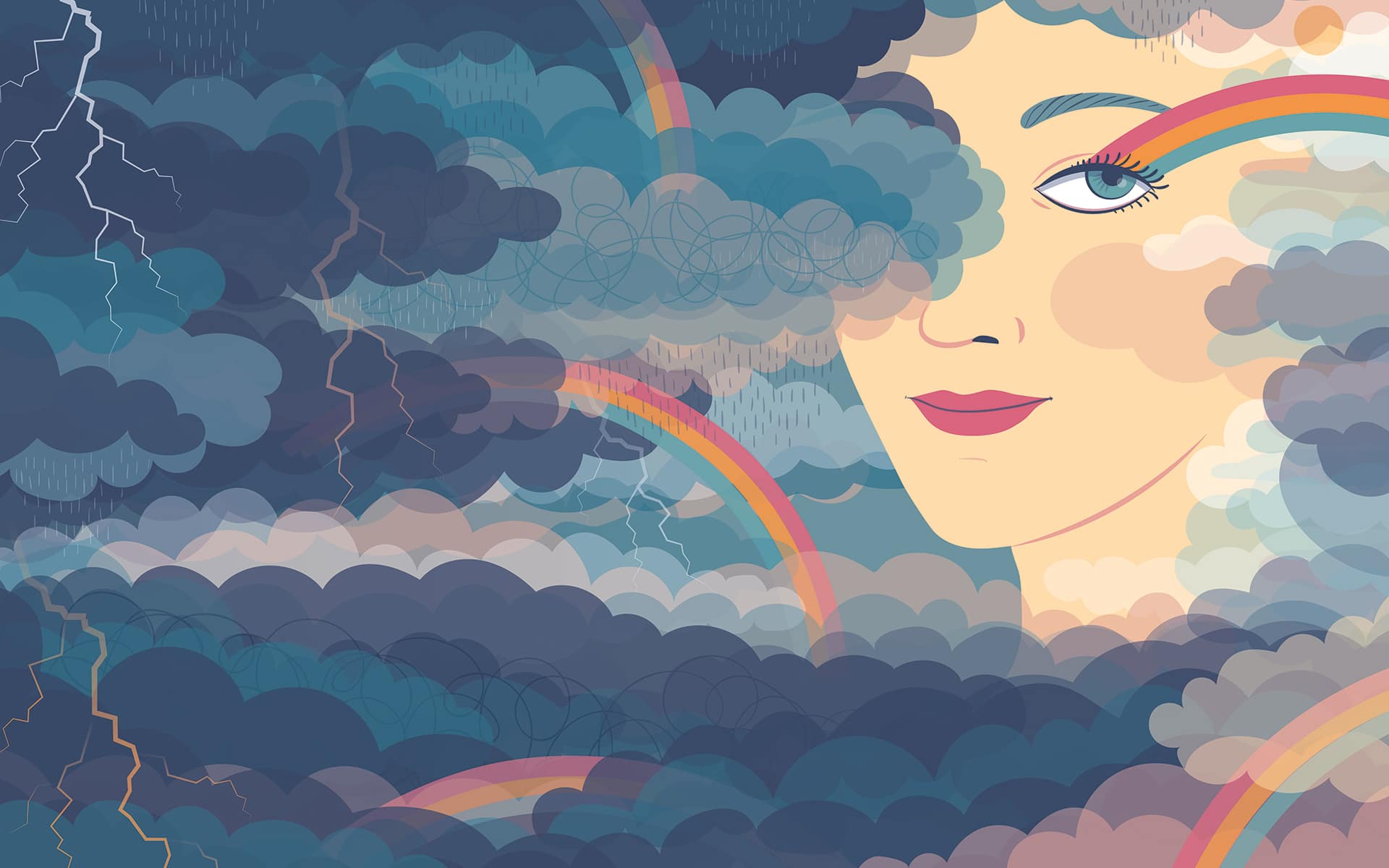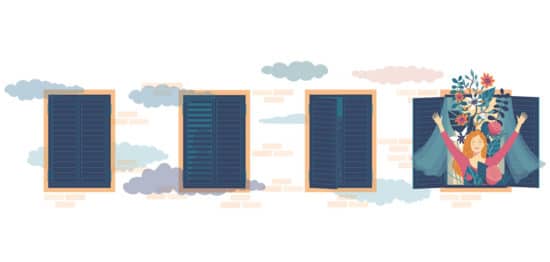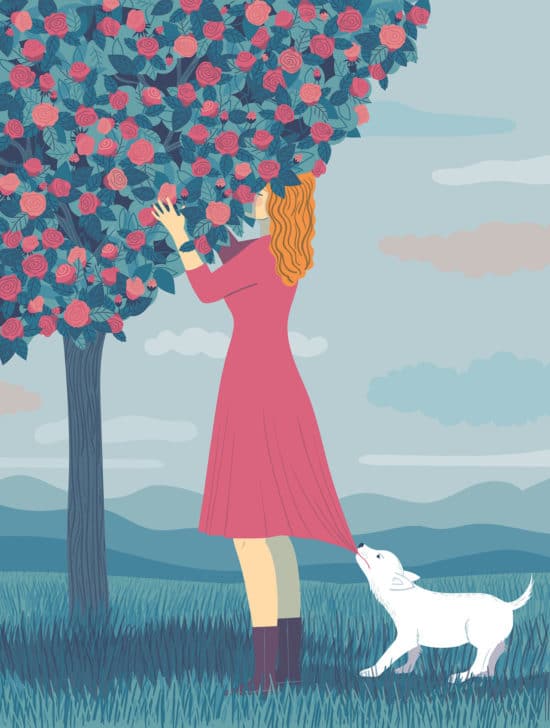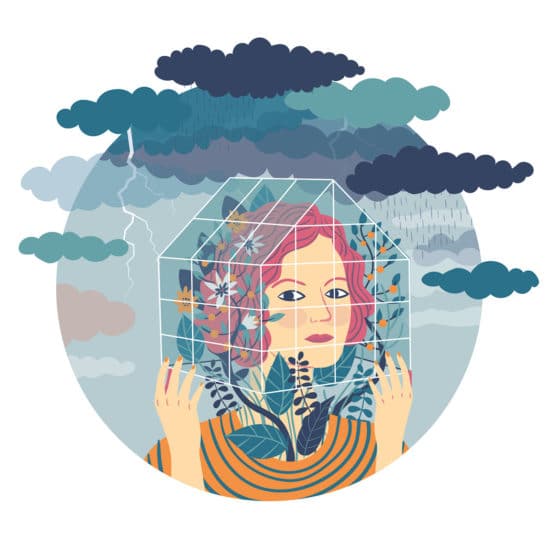Antoine had cut himself on the broken glass coaster we’d left on top of the refrigerator. My husband was whispering the details as I walked through the door. “I think he’s going to be fine,” he said quietly, “but we should give him some money.”
Antoine worked for the service that came to clean our friend’s apartment while we were staying there. When I went upstairs to find him, he said his hand was probably going to be OK, but he mentioned a past event when a tree branch had punctured his skin, causing an infection in his arm. I glanced at the small see-through bandage on his index finger and saw no evidence of anything serious, yet I sensed that Antoine felt vulnerable. I offered to take him to the emergency room, which he declined. He seemed fine, but how did I know? As he left I pressed some cash into his hand and gave him my phone number, inviting him to call me if anything terrible came from this mishap.
I could have been suspicious and self-protective, careful not to appear too responsible lest it bite me in the hindsight, but this just isn’t how I want to live my life. Call me an optimist.
The next day I tracked down the cleaning service to see how Antoine was. The person there said he had mentioned the incident but was able to work. She said she’d tell him I called.
When I told my husband about the call he was incredulous. “Are you crazy? I only told you he cut himself because I thought we should slip him a few bucks for his trouble. You didn’t have to make such a big thing of it. Now they’ll probably sue us. Did you ever think of that!?”
The thing was, I had. I’d seen way too many courtroom dramas not to consider the possible ramifications of showing my concern—not to mention that both my parents were lawyers.
When my husband first told me about the incident, I had felt my chest tighten. And when I went looking for Antoine, I noticed two voices sparring for my attention: one that echoed my husband’s cynical “Don’t cop to anything!” vigilance and one gently whispering, “But I like myself much better when I stay close to my humanity.” Someone who was just trying to make his way through life had cut himself on a coaster we’d broken. In my eyes, we were responsible for his care. I took a breath and decided to follow the second voice.
“When you seek safety behind a self-protective shield of cynicism, you don’t see that life is nuanced. Behind immovable ideas of who and what is and isn’t to be trusted, you remain isolated.”
I could have been suspicious and self-protective, careful not to appear too responsible lest it bite me in the hindsight, but this just isn’t how I want to live my life. I find that if I stay open, awake, and aware; if I investigate and act in accordance with my values; and if I err on the side of trusting in the general good-heartedness of other humans, my day-to-day life offers me many lovely moments. Difficult things happen, but overall, my clouds do tend to harbor silver linings. Call me an optimist.
I once tried my hand at stand-up comedy. I quickly learned that other comics viewed optimism…well, cynically. After all, for many people daily life is a stream of violence, suffering, and uncaring. Lean down to smell the roses—and someone steals your wallet. Only a chump would expect it to be otherwise.
P.T. Barnum famously once said that there’s a sucker born every minute. None of us wants to be that sucker. So by fine-tuning our radar for threats and assuming the worst of everyone and everything, maybe, just maybe, we won’t get caught with our guard down. Cynicism lets us stay distant, cool, and superior to the muck of the human experience. If life were high school, it’d be where the cool kids hang out.
Stranger danger
The reasons for cynicism may seem valid at times. Life is unpredictable. Painful stuff happens. Sometimes the person you trusted, the job you counted on, the seemingly friendly stranger pans out differently than you hoped. In those moments, you might feel that staying on the alert for anything negative or unpleasant might be the only way to avoid having the rug pulled out from under you, again. Maybe you think that cynicism has worked pretty well for you all these years, so why change? Perhaps it is just the devil you know.
But if happiness is your goal, how can you hope to achieve it if you’re holding so tightly to the belief that people can’t be trusted, systems fail, and things are never going to go your way?
When you seek safety behind a self-protective shield of cynicism, you don’t see that life is nuanced. Yes, it’s a risk to remain open to others, especially others you don’t know. Stranger danger! But being open is also how you make new friends, fall in love, experience delight, and grow from everything you encounter. It’s how you become a more fully functioning agent in your own life and in the world.
More than likely you’ll uncover some scary, painful, and unpleasant stuff along the way. You’ll encounter lots of middle, no-big-deal stuff, too. But if you’re looking for it, you’ll also see there’s lots of good stuff happening, all the time.
Cynicism can’t afford this view of life’s subtleties; it paints from a palette of black and white. Behind immovable ideas of who and what is and isn’t to be trusted, you remain isolated. But instead of making you stronger, this stance keeps you from developing the resilience you gain when you bounce back from the fall, the heartbreak, the stolen wallet. And social scientists tell us that resilience is one of the biggest indicators of happiness and life satisfaction. Your ability to deal with difficulties, learn from them, and move on, determines whether you thrive or merely survive.
Mindfulness attunes us to the subtleties in our minds and in our bodies. You become a ninja of your inner landscape.
To make matters worse, instead of protecting you, cynicism can actually attract the people and situations that seem to confirm your belief that life is a cruel joke. This is due to a psychological phenomenon called “confirmation bias,” or, as Harvard researcher David Perkins calls it, “myside” bias. It may be a negative view, but it’s mine. Without recognizing it, you seek out people and experiences that mirror your views. So your Facebook feed gets filled with tales of warning and your ears perk up at news stories that fuel your fears. You find evidence of a dark, foreboding world everywhere you turn.
And underneath it all, your cynical view may be preventing you from noticing how your own thinking and behavior might, in even some small way, incite situations that lead to pain, upset, or drama—the very outcomes that “prove” how you can’t trust anyone or anything.
A better alert system
Mindfulness offers a different way to be alert and relaxed in our lives. When practiced regularly, it attunes you to the subtleties in your mind and body—you become a ninja of your inner landscape. With three-dimensional awareness, you pick up on moments of ease and joy, not just threat. And with relaxed but heightened attention, you’re in a much better position to remain present to it all—the pleasant, the unpleasant, and the relatively neutral—while navigating with more dexterity and grace.
This perspective might also allow you to see how you connect unrelated events and put a negative spin on them. “Have you heard about Morty? Dead, at just 95! And he took vitamins! I knew those things didn’t work!”
Through mindfulness, we come to know ourselves with greater kindness. Without judgment, we can acknowledge our fears about people and the world and be curious about them instead of just accepting them as fact.
It also helps you to recognize how a cynical attitude sits in your body. Is it heavy or light? Does it feel open or closed? Likewise, how does it feel when you have an unexpectedly pleasant encounter or experience? Can you notice a difference?
Optimism isn’t about shielding yourself from any experience, or about being careless or falsely hopeful and putting yourself or anyone else in harm’s way. Instead it encourages wisdom by seeing the dark and the light, and by looking deeply at your choices so that you stay in alignment with your values. When you live from this optimistic place, you free yourself up to be a much more powerful presence in all situations, even the ones you don’t want. Imagine being able to hold the space for hard-knuckle reality, and still remaining open.
From a health standpoint, an optimistic view heavily tips the scales in your favor. It’s been linked to longevity, helps you cope with disease, and speeds recovery from surgery. Optimism is also tonic for your psychological health. Research shows that increased access to positive feelings makes social interactions easier and more enjoyable. And by broadening your sense of possibility and your thinking, optimism supports greater opportunity, which in turn creates more positive feelings and better social interactions, and onward it goes.
“Optimism isn’t about shielding yourself from the truth. Instead it encourages wisdom by knowing yourself. When you live from this place, you show up as a much more powerful presence in all situations.”
When Antoine cut himself on the coaster at our friend’s house, I opened myself to being optimistic about the outcome. I chose to care and stay close to my humanity. And when I reached out to him the next day, my husband was right: I had potentially given him and his bosses ammunition to take advantage of the situation.
I did both of these things mindfully, knowing what was at stake. And still, I made the conscious choice not to armor myself and act out of fear. I chose optimism.
This is the kind of choice we all face every day.
Antoine got the message that I had called to check on him, and sent me a text later that day. “It’s okay today, so not to worry,” he wrote.
Mindfulness is about being awake to possibility. We can choose, every time, to be open or closed to what comes our way. We can bring fresh eyes and a fresh perspective to each interplay of dark and light. We can be realistic, optimistic, and curious about it all.
Mistaken Identity
Think first impressions don’t lie? Let’s reconsider.
Have you ever made a negative assumption about someone, only to later find out that you had the person pegged all wrong?
Snap judgments can reveal a lot about our deeper biases and fears. When you unpack them, you create new opportunities to better know your own mind—and more freedom to choose how you want to move through life.
Try this:
Take a moment and recall someone you may have had a strong cynical opinion about: your best friend’s new boyfriend, your good-looking neighbor, the new sales manager at work.
Then, get curious: What was it that you percieved that provoked your cynical line of thinking? Was it their name? Their role in society? Their accent? The way they looked? Did they remind you of someone?
When you were proven wrong, how did it feel? Was it a relief? Embarrassing? Frustrating? Did it make you feel hopeful or maybe a bit vulnerable?
How did this experience shift your thoughts and feelings about the person, about yourself, and about the world?
What did you learn about how quickly a negative viewpoint can seize your mind and reframe what you are perceiving?
This exercise is not about being right or wrong.
It’s about developing the awareness to notice when you might be making choices that either shut down possibility or let you remain open.
It’s so easy to mentally categorize people so that they fit into the story line we create to make sense of our world. But when you’re willing to take a deeper look, you readily discover that nobody is just one way. We’re multidimensional, made up of many parts and experiences.
Each time you catch yourself making an assumption about someone, you have the opportunity to pause, take a breath, ask yourself “Is it true?” and consider a shift in how you view them.
Not predjudging people is a deep source of generosity. When we push away others with our negative frames of reference, we’re protecting cozy territory we’ve marked off for ourselves, but openness is the far more invigorating strategy.
The Science of Optimism
Being guarded and careful might seem like a sound strategy, but maintaining an upbeat, positive frame of mind may extend your life.
One of the strongest predictors of developing age-related dementia is the presence of a specific gene variant called APOE ε4. Carriers are 47% more likely to develop the age-related disease than non-carriers.
But there might be an even bigger predictor of dementia: how you feel about aging.
Researchers at Yale University recently discovered that people who carry the gene variant yet who hold positive beliefs about aging are almost 50% less likely to develop dementia than those with negative age beliefs.
How is this possible? What does a positive outlook have to do with whether a gene gets expressed or not? Add this question and this exciting new finding to the growing mound of evidence that positive outlook, i.e., optimism, has demonstrable impact on our physical, mental, and emotional health.
For the dementia study, researchers speculate that positive beliefs about aging are protective: By feeling good overall about your experience of aging, you experience less stress. Stress has long been identified as a contributor to numerous health conditions and has been indicated as a possible contributor to dementia.
A positive outlook may also serve as a coping mechanism against difficulty, in this case, against societal ageism. The role of optimism as a protective coping strategy has been well documented across a spectrum of health concerns, including speedier recovery from surgery and less rehospitalization following medical intervention as well as in the experience of pain. Numerous studies over the past few decades have identified a positive outlook with reductions in heart disease, stroke, and perception of pain, and indicated its role in strengthening the immune system. In one study of more than 2,500 men and women over age 65, those with the most positive outlook had the lowest blood pressures.
And, we recently learned, optimism might even help you live longer. In 2016, researchers at Harvard University’s T.H. Chan School of Public Health found that women who were optimistic had 27% less risk of dying from major diseases, including cancer, heart disease, and respiratory disease.
The reason? Optimism is correlated to healthier behaviors, such as eating well, exercise, and sleeping better. But the effects may not only be behavioral: Optimism is also linked to lower inflammation and cortisol levels and healthier lipid levels.
These findings “suggest that we should make efforts to boost optimism, which has been shown to be associated with healthier behaviors and healthier ways of coping with life challenges,” study coauthor Eric Kim said.
Accentuate the Positive
The (not so) secret to seeing more goodness.
In order to support an optimistic view, it’s helpful to recognize that the more attention you give something, the more of it you’ll notice. This works both ways. The more you expect the worst—from people, from life—the more of it you’ll witness. The more things you recognize as positives in your life, and in the world, the easier it becomes to recognize them in the future. Science supports this. Writing in a gratitude journal, for example, has been shown to help fine-tune your ability to notice the good things in your life.
As you sharpen your vision to see the good, it can help loosen your grip in expectation of something going wrong. You begin to see that, in spite of difficulty or uncertainty, there’s actually a lot to feel positive about.
Try this
Get a stack of colored index cards (sticky notes work, too). Then, look at your week ahead and choose an “Optimism Day.” When the day comes, periodically stop what you’re doing and take note of anything that makes you feel good.
The sun finally came out.
The short line at the coffee shop this morning.
A moment of shared laughter with your coworker.
You’re learning to eat better and feeling the positive effects.
Feeling more present and in command in your life.
An instance where you were able to stay cool when you’d usually blow your top.
The power of medicine and how it’s helping your mother.
Space X and the idea of Star Man zooming through the cosmos.
Write each good thing on a separate index card or note. You can even decorate your optimistic messages with colored pens, labels, stickers—anything to support the good feeling you’re capturing.
Visual aids can be helpful reminders, so display these positive messages where you’ll see them. You can keep your notes displayed, take a photo to create a record of each week’s cache, or take ’em down and start fresh the next week. Soon enough you’ll likely see that there is no shortage of things to make you feel optimistic or bring a bit of warmth to your heart.
Beginning with Awareness
When we clear our mental slate, we get kinder.
Kindness and caring for others doesn’t only arise from good wishes. It can also emerge naturally from noticing fixed viewpoints and letting them go, however briefly. After all, when they arise again—as they will—we can simply repeat the process.
- Notice Irritation
When you find you’re getting edgy and irritable with what someone else is up to, see if you can take a break in the action and explore underneath the irritation, going to its roots. Don’t waste time beating yourself up about it. Just take a moment to see what your curious, investigating mind is revealing.
- Examine the Story You’re Telling Yourself
Underneath the irritation is likely to be a story line. And the story is where the bias is held. “These people…”; “When someone does that, they’re…”; “I can’t stand it when…” Part of what’s going on here is that the powerful discerning mind we need to evaluate our own and others’ behavior gets carried away. We’ve shut off our curiosity and decided what’s what. See if you can drop the story without the world falling apart.
Enjoy the Space
In place of the fixed story line, a gap will emerge. Without your predetermined and prepackaged label, you’ll begin to notice more details. You’ll begin to notice the humanity and vulnerability you share with others—however different and however flawed they may appear from your perspective. The less you “know” in this case, the better. You can see freshly.
Share the Warmth
Chances are that, without the armor of your fixed label to create barriers and distance between you and another, you may be touched by their humanity. It may soften you up and open your heart. You may find a luminous warmth lies within. Let it be there. Appreciate it. It will spread naturally, if you remain with it for a while.
Move On
Avoid fixating on the process of unmasking as a big deal. The less you think it’s a momentous thing, the more likely it is to become a simple habit, like drinking tea or coffee.






